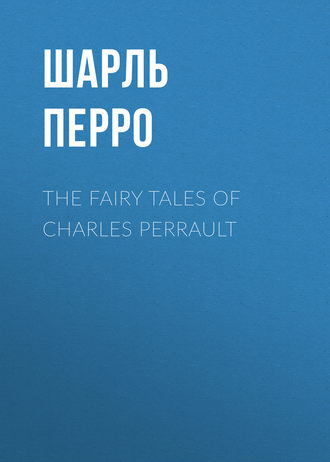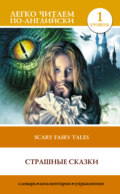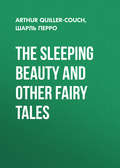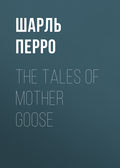
Шарль Перро
The Fairy Tales of Charles Perrault
The Fairy
There was, once upon a time, a widow, who had two daughters. The eldest was so much like her in the face and humour, that whoever looked upon the daughter saw the mother. They were both so disagreeable, and so proud, that there was no living with them. The youngest, who was the very picture of her father, for courtesy and sweetness of temper, was withal one of the most beautiful girls ever seen. As people naturally love their own likeness, this mother even doated on her eldest daughter, and at the same time had a horrible aversion for the youngest. She made her eat in the kitchen, and work continually.
Among other things, this poor child was forced twice a day to draw water above a mile and a half off the house, and bring home a pitcher full of it. One day, as she was at this fountain, there came to her a poor woman, who begged of her to let her drink.
"O ay, with all my heart, Goody," said this pretty maid; and rinsing immediately the pitcher, she took up some water from the clearest place of the fountain, and gave it to her, holding up the pitcher all the while, that she might drink the easier.
The good woman having drank, said to her:
"You are so very pretty, my dear, so good and so mannerly, that I cannot help giving you a gift" (for this was a Fairy, who had taken the form of a poor country-woman, to see how far the civility and good manners of this pretty girl would go). "I will give you for gift," continued the Fairy, "that at every word you speak, there shall come out of your mouth either a flower, or a jewel."
When this pretty girl came home, her mother scolded at her for staying so long at the fountain.
"I beg your pardon, mamma," said the poor girl, "for not making more haste," and, in speaking these words, there came out of her mouth two roses, two pearls, and two diamonds.
"What is this I see?" said her mother quite astonished, "I think I see pearls and diamonds come out of the girl's mouth! How happens this, child?" (This was the first time she ever called her child.)
The poor creature told her frankly all the matter, not without dropping out infinite numbers of diamonds.
"In good faith," cried the mother, "I must send my child thither. Come hither, Fanny, look what comes out of thy sister's mouth when she speaks! Would'st not thou be glad, my dear, to have the same gift given to thee? Thou hast nothing else to do but go and draw water out of the fountain, and when a certain poor woman asks thee to let her drink, to give it her very civilly."
"It would be a very fine sight indeed," said this ill-bred minx, "to see me go draw water!"
"You shall go, hussey," said the mother, "and this minute."
So away she went, but grumbling all the way, taking with her the best silver tankard in the house.
She was no sooner at the fountain, than she saw coming out of the wood a lady most gloriously dressed, who came up to her, and asked to drink. This was, you must know, the very Fairy who appeared to her sister, but had now taken the air and dress of a princess, to see how far this girl's rudeness would go.
"Am I come hither," said the proud, saucy slut, "to serve you with water, pray? I suppose the silver tankard was brought purely for your ladyship, was it? However, you may drink out of it, if you have a fancy."
"You are not over and above mannerly," answered the Fairy, without putting herself in a passion. "Well then, since you have so little breeding, and are so disobliging, I give you for gift, that at every word you speak there shall come out of your mouth a snake or a toad."
So soon as her mother saw her coming, she cried out: "Well, daughter?"
"Well, mother?" answered the pert hussey, throwing out of her mouth two vipers and two toads.
"O mercy!" cried the mother, "what is it I see! O, it is that wretch her sister who has occasioned all this; but she shall pay for it"; and immediately she ran to beat her. The poor child fled away from her and went to hide herself in the forest, not far from thence.
The King's son, then on his return from hunting, met her, and seeing her so very pretty, asked her what she did there alone, and why she cried.
"Alas! sir, my mamma has turned me out of doors."
The King's son, who saw five or six pearls, and as many diamonds, come out of her mouth, desired her to tell him how that happened. She thereupon told him the whole story; and so the King's son fell in love with her; and, considering with himself that such a gift was worth more than any marriage-portion whatsoever in another, conducted her to the palace of the King his father, and there married her.
As for her sister, she made herself so much hated that her own mother turned her off; and the miserable wretch, having wandered about a good while without finding anybody to take her in, went to a corner in the wood and there died.
The Moral
Money and jewels still, we find,
Stamp strong impressions on the mind.
But sweet discourse more potent riches yields;
Of higher value is the pow'r it wields.
Another
Civil behaviour costs indeed some pains,
Requires of complaisance some little share;
But soon or late its due reward it gains,
And meets it often when we're not aware.
Blue Beard
There was a man who had fine houses, both in town and country, a deal of silver and gold plate, embroidered furniture, and coaches gilded all over with gold. But this man had the misfortune to have a blue beard, which made him so frightfully ugly, that all the women and girls ran away from him.
One of his neighbours, a lady of quality, had two daughters who were perfect beauties. He desired of her one of them in marriage, leaving to her the choice which of the two she would bestow upon him. They would neither of them have him, and each made the other welcome of him, being not able to bear the thought of marrying a man who had a blue beard. And what besides gave them disgust and aversion, was his having already been married to several wives, and nobody ever knew what became of them.
Blue Beard, to engage their affection, took them, with the lady their mother, and three or four ladies of their acquaintance, with other young people of the neighbourhood, to one of his country seats, where they stayed a whole week. There was nothing then to be seen but parties of pleasure, hunting, fishing, dancing, mirth and feasting. Nobody went to bed, but all passed the night in playing tricks upon each other. In short, every thing succeeded so well, that the youngest daughter began to think the master of the house not to have a beard so very blue, and that he was a mighty civil gentleman. As soon as they returned home, the marriage was concluded.
About a month afterwards Blue Beard told his wife that he was obliged to take a country journey for six weeks at least, about affairs of very great consequence, desiring her to divert herself in his absence, to send for her friends and acquaintances, to carry them into the country, if she pleased, and to make good cheer wherever she was.
"Here," said he, "are the keys of the two great wardrobes, wherein I have my best furniture; these are of my silver and gold plate, which is not every day in use; these open my strong boxes, which hold my money, both gold and silver; these my caskets of jewels; and this is the master-key to all my apartments. But for this little one here, it is the key of the closet at the end of the great gallery on the ground floor. Open them all; go into all and every one of them; except that little closet which I forbid you, and forbid it in such a manner that, if you happen to open it, there will be no bounds to my just anger and resentment."
She promised to observe, very exactly, whatever he had ordered; when he, after having embraced her, got into his coach and proceeded on his journey.
Her neighbours and good friends did not stay to be sent for by the newmarried lady, so great was their impatience to see all the rich furniture of her house, not daring to come while her husband was there, because of his blue beard which frightened them. They ran thro' all the rooms, closets, and wardrobes, which were all so rich and fine, that they seemed to surpass one another.
After that, they went up into the two great rooms, where were the best and richest furniture; they could not sufficiently admire the number and beauty of the tapestry, beds, couches, cabinets, stands, tables, and looking-glasses in which you might see yourself from head to foot; some of them were framed with glass, others with silver, plain and gilded, the finest and most magnificent which were ever seen. They ceased not to extol and envy the happiness of their friend, who in the mean time no way diverted herself in looking upon all these rich things, because of the impatience she had to go and open the closet of the ground floor. She was so much pressed by her curiosity, that, without considering that it was very uncivil to leave her company, she went down a little back-stair-case, and with such excessive haste, that she had twice or thrice like to have broken her neck.
Being come to the closet door, she made a stop for some time, thinking upon her husband's orders, and considering what unhappiness might attend her if she was disobedient; but the temptation was so strong she could not overcome it. She took then the little key, and opened it trembling; but could not at first see any thing plainly, because the windows were shut. After some moments she began to perceive that the floor was all covered over with clotted blood, in which were reflected the bodies of several dead women ranged against the walls: these were all the wives whom Blue Beard had married and murdered one after another. She was like to have died for fear, and the key, which she pulled out of the lock, fell out of her hand.
After having somewhat recovered her senses, she took up the key, locked the door, and went up stairs into her chamber to recover herself; but she could not, so much was she frightened. Having observed that the key of the closet was stained with blood, she tried two or three times to wipe it off, but the blood would not come off; in vain did she wash it, and even rub it with soap and sand, the blood still remained, for the key was a Fairy, and she could never make it quite clean; when the blood was gone off from one side, it came again on the other.
Blue Beard returned from his journey the same evening, and said, he had received letters upon the road, informing him that the affair he went about was ended to his advantage. His wife did all she could to convince him she was extremely glad of his speedy return. Next morning he asked her for the keys, which she gave him, but with such a trembling hand, that he easily guessed what had happened.
"What," said he, "is not the key of my closet among the rest?"
"I must certainly," answered she, "have left it above upon the table."
"Fail not," said Blue Beard, "to bring it me presently."
After putting him off several times, she was forced to bring him the key. Blue Beard, having very attentively considered it, said to his wife:
"How comes this blood upon the key?"
"I do not know," cried the poor woman, paler than death.
"You do not know," replied Blue Beard; "I very well know, you were resolved to go into the closet, were you not? Mighty well, Madam; you shall go in, and take your place among the ladies you saw there."
Upon this she threw herself at her husband's feet, and begged his pardon with all the signs of a true repentance for her disobedience. She would have melted a rock, so beautiful and sorrowful was she; but Blue Beard had a heart harder than any rock.
"You must die, Madam," said he, "and that presently."
"Since I must die," answered she, looking upon him with her eyes all bathed in tears, "give me some little time to say my prayers."
"I give you," replied Blue Beard, "half a quarter of an hour, but not one moment more."
When she was alone, she called out to her sister, and said to her:
"Sister Anne" (for that was her name), "go up I beg you, upon the top of the tower, and look if my brothers are not coming; they promised me that they would come to-day, and if you see them, give them a sign to make haste."
Her sister Anne went up upon the top of the tower, and the poor afflicted wife cried out from time to time, "Anne, sister Anne, do you see any one coming?"
And sister Anne said:
"I see nothing but the sun, which makes a dust, and the grass growing green."
In the mean while Blue Beard, holding a great scimitar in his hand, cried out as loud as he could bawl to his wife:
"Come down instantly, or I shall come up to you."
"One moment longer, if you please," said his wife, and then she cried out very softly:
"Anne, sister Anne, dost thou see any body coming?"
And sister Anne answered:
"I see nothing but the sun, which makes a dust, and the grass growing green."
"Come down quickly," cried Blue Beard, "or I will come up to you."
"I am coming," answered his wife; and then she cried:
"Anne, sister Anne, dost thou see any one coming?"
"I see," replied sister Anne, "a great dust that comes this way."
"Are they my brothers?"
"Alas! no, my dear sister, I see a flock of sheep."
"Will you not come down?" cried Blue Beard.
"One moment longer," said his wife, and then she cried out:
"Anne, sister Anne, dost thou see nobody coming?"
"I see," said she, "two horsemen coming, but they are yet a great way off."
"God be praised," she cried presently, "they are my brothers; I am beckoning to them, as well as I can, for them to make haste."
Then Blue Beard bawled out so loud, that he made the whole house tremble. The distressed wife came down, and threw herself at his feet, all in tears, with her hair about her shoulders.
"Nought will avail," said Blue Beard, "you must die"; then, taking hold of her hair with one hand, and lifting up his scimitar with the other, he was going to take off her head.
The poor lady turning about to him, and looking at him with dying eyes, desired him to afford her one little moment to recollect herself.
"No, no," said he, "recommend thyself to God," and was just ready to strike.
At this very instant there was such a loud knocking at the gate, that Blue Beard made a sudden stop. The gate was opened, and presently entered two horsemen, who drawing their swords, ran directly to Blue Beard. He knew them to be his wife's brothers, one a dragoon, the other a musqueteer; so that he ran away immediately to save himself; but the two brothers pursued so close, that they overtook him before he could get to the steps of the porch, when they ran their swords thro' his body and left him dead. The poor wife was almost as dead as her husband, and had not strength enough to rise and welcome her brothers.
Blue Beard had no heirs, and so his wife became mistress of all his estate. She made use of one part of it to marry her sister Anne to a young gentleman who had loved her a long while; another part to buy captains' commissions for her brothers; and the rest to marry herself to a very worthy gentleman, who made her forget the ill time she had passed with Blue Beard.
The Moral
O curiosity, thou mortal bane!
Spite of thy charms, thou causest often pain
And sore regret, of which we daily find
A thousand instances attend mankind:
For thou – O may it not displease the fair —
A fleeting pleasure art, but lasting care.
And always proves, alas! too dear the prize,
Which, in the moment of possession, dies.
Another
A very little share of common sense,
And knowledge of the world, will soon evince
That this a story is of time long pass'd;
No husbands now such panic terrors cast;
Nor weakly, with a vain despotic hand,
Imperious, what's impossible, command:
And be they discontented, or the fire
Of wicked jealousy their hearts inspire,
They softly sing; and of whatever hue
Their beards may chance to be, or black, or blue,
Grizeld, or russet, it is hard to say
Which of the two, the man or wife, bears sway.
The Sleeping Beauty in the Wood
There were formerly a King and a Queen, who were so sorry that they had no children, so sorry that it cannot be expressed. They went to all the waters in the world; vows, pilgrimages, all ways were tried and all to no purpose. At last, however, the Queen proved with child, and was brought to bed of a daughter. There was a very fine christening; and the Princess had for her godmothers all the Fairies they could find in the whole kingdom (they found seven), that every one of them might give her a gift, as was the custom of Fairies in those days, and that by this means the Princess might have all the perfections imaginable.
After the ceremonies of the christening were over, all the company returned to the King's palace, where was prepared a great feast for the Fairies. There was placed before every one of them a magnificent cover with a case of massive gold, wherein were a spoon, knife and fork, all of pure gold set with diamonds and rubies. But as they were all sitting down at table, they saw come into the hall a very old Fairy whom they had not invited, because it was above fifty years since she had been out of a certain tower, and she was believed to be either dead or inchanted. The King ordered her a cover, but could not furnish her with a case of gold as the others, because they had seven only made for the seven Fairies. The old Fairy fancied she was slighted, and muttered some threat between her teeth. One of the young Fairies, who sat by her, overheard how she grumbled; and judging that she might give the little Princess some unlucky gift, went, as soon as they rose from the table, and hid herself behind the hangings, that she might speak last, and repair, as much as possible she could, the evil which the old Fairy might intend.
In the mean while all the Fairies began to give their gifts to the Princess. The youngest gave her for gift, that she should be the most beautiful person in the world; the next, that she should have the wit of an angel; the third, that she should have a wonderful grace in every thing she did; the fourth, that she should dance perfectly well; the fifth, that she should sing like a nightingale; and the sixth, that she should play upon all kinds of music to the utmost perfection.
The old Fairy's turn coming next, with a head shaking more with spite than age, she said, that the Princess should have her hand pierced with a spindle, and die of the wound. This terrible gift made the whole company tremble, and every body fell a-crying.
At this very instant the young Fairy came out from behind the hangings, and spake these words aloud:
"Be reassured, O King and Queen; your daughter shall not die of this disaster: it is true, I have no power to undo intirely what my elder has done. The Princess shall indeed pierce her hand with a spindle; but instead of dying, she shall only fall into a profound sleep, which shall last a hundred years; at the expiration of which a king's son shall come and awake her."
The King, to avoid the misfortune foretold by the old Fairy, caused immediately proclamations to be made, whereby every-body was forbidden, on pain of death, to spin with a distaff and spindle or to have so much as any spindle in their houses.
About fifteen or sixteen years after, the King and Queen being gone to one of their houses of pleasure, the young Princess happened one day to divert herself running up and down the palace; when going up from one apartment to another, she came into a little room on the top of a tower, where a good old woman, alone, was spinning with her spindle. This good woman had never heard of the King's proclamation against spindles.
"What are you doing there, Goody?" said the Princess.
"I am spinning, my pretty child," said the old woman, who did not know who she was.
"Ha!" said the Princess, "this is very pretty; how do you do it? Give it to me, that I may see if I can do so." She had no sooner taken the spindle into her hand, than, whether being very hasty at it, somewhat unhandy, or that the decree of the Fairy had so ordained it, it ran into her hand, and she fell down in a swoon.
The good old woman not knowing very well what to do in this affair, cried out for help. People came in from every quarter in great numbers; they threw water upon the Princess's face, unlaced her, struck her on the palms of her hands, and rubbed her temples with Hungary-water; but nothing would bring her to herself.
And now the King, who came up at the noise, bethought himself of the prediction of the Fairies, and judging very well that this must necessarily come to pass, since the Fairies had said it, caused the Princess to be carried into the finest apartment in his palace, and to be laid upon a bed all embroidered with gold and silver. One would have taken her for an angel, she was so very beautiful; for her swooning away had not diminished one bit of her complexion; her cheeks were carnation, and her lips like coral; indeed her eyes were shut, but she was heard to breathe softly, which satisfied those about her that she was not dead. The King commanded that they should not disturb her, but let her sleep quietly till her hour of awakening was come.
The good Fairy, who had saved her life by condemning her to sleep a hundred years, was in the kingdom of Matakin, twelve thousand leagues off, when this accident befell the Princess; but she was instantly informed of it by a little dwarf, who had boots of seven leagues, that is, boots with which he could tread over seven leagues of ground at one stride. The Fairy came away immediately, and she arrived, about an hour after, in a fiery chariot, drawn by dragons. The King handed her out of the chariot, and she approved every thing he had done; but, as she had a very great foresight, she thought, when the Princess should awake, she might not know what to do with herself, being all alone in this old palace; and this was what she did: She touched with her wand every thing in the palace (except the King and the Queen), governesses, maids of honour, ladies of the bedchamber, gentlemen, officers, stewards, cooks, under-cooks, scullions, guards, with their beef-eaters, pages, footmen; she likewise touched all the horses which were in the stables, as well as their grooms, the great dogs in the outward court, and pretty little Mopsey too, the Princess's little spaniel-bitch, which lay by her on the bed.
Immediately upon her touching them, they all fell asleep, that they might not awake before their mistress, and that they might be ready to wait upon her when she wanted them. The very spits at the fire, as full as they could hold of partridges and pheasants, did fall asleep, and the fire likewise. All this was done in a moment. Fairies are not long in doing their business.
And now the King and the Queen, having kissed their dear child without waking her, went out of the palace, and put forth a proclamation, that nobody should dare to come near it. This, however, was not necessary; for, in a quarter of an hour's time, there grew up, all round about the park, such a vast number of trees, great and small, bushes and brambles, twining one within another, that neither man nor beast could pass thro'; so that nothing could be seen but the very top of the towers of the palace; and that too, not unless it was a good way off. Nobody doubted but the Fairy gave herein a sample of her art, that the Princess, while she continued sleeping, might have nothing to fear from any curious people.
When a hundred years were gone and past, the son of the King then reigning, and who was of another family from that of the sleeping Princess, being gone a-hunting on that side of the country, asked, what were those towers which he saw in the middle of a great thick wood? Every one answered according as they had heard; some said that it was a ruinous old castle, haunted by spirits; others, that all the sorcerers and witches of the country kept there their sabbath, or nights meeting. The common opinion was that an Ogre1 lived there, and that he carried thither all the little children he could catch, that he might eat them up at his leisure, without any-body's being able to follow him, as having himself, only, the power to pass thro' the wood.
The Prince was at a stand, not knowing what to believe, when a very aged countryman spake to him thus: "May it please your Royal Highness, it is now above fifty years since I heard my father, who had heard my grandfather, say that there then was in this castle, a Princess, the most beautiful was ever seen; that she must sleep there a hundred years, and should be awaked by a king's son; for whom she was reserved." The young Prince was all on fire at these words, believing, without a moment's doubt, that he could put an end to this rare adventure; and pushed on by love and honour resolved that moment to look into it.
Scarce had he advanced towards the wood, when all the great trees, the bushes and brambles, gave way of themselves to let him pass thro'; he walked up to the castle which he saw at the end of a large avenue which he went into; and what a little surprised him was, that he saw none of his people could follow him, because the trees closed again, as soon as he had pass'd thro' them. However, he did not cease from continuing his way; a young and amorous Prince is always valiant. He came into a spacious outward court, where everything he saw might have frozen up the most fearless person with horror. There reigned over all a most frightful silence; the image of death everywhere shewed itself, and there was nothing to be seen but stretched out bodies of men and animals, all seeming to be dead. He, however, very well knew, by the ruby faces and pimpled noses of the beef-eaters, that they were only asleep; and their goblets, wherein still remained some drops of wine, shewed plainly, that they fell asleep in their cups.
He then crossed a court paved with marble, went up the stairs, and came into the guard-chamber, where the guards were standing in their ranks, with their muskets upon their shoulders, and snoring as loud as they could. After that he went through several rooms full of gentlemen and ladies, all asleep, some standing, others sitting. At last he came into a chamber all gilded with gold, where he saw, upon a bed, the curtains of which were all open, the finest sight was ever beheld: a Princess, who appeared to be about fifteen or sixteen years of age, and whose bright, and in a manner resplendent beauty, had somewhat in it divine. He approached with trembling and admiration, and fell down before her upon his knees.
And now, as the inchantment was at an end, the Princess awaked, and looking on him with eyes more tender than the first view might seem to admit of: "Is it you, my Prince," said she to him, "you have tarried long."
The Prince, charmed with these words, and much more with the manner in which they were spoken, knew not how to shew his joy and gratitude; he assured her, that he loved her better than he did himself; his discourse was not well connected, but it pleased her all the more; little eloquence, a great deal of love. He was more at a loss than she, and we need not wonder at it; she had time to think on what to say to him; for it is very probable (though history mentions nothing of it) that the good Fairy, during so long a sleep, had entertained her with pleasant dreams. In short, when they talked four hours together, they said not half what they had to say.







